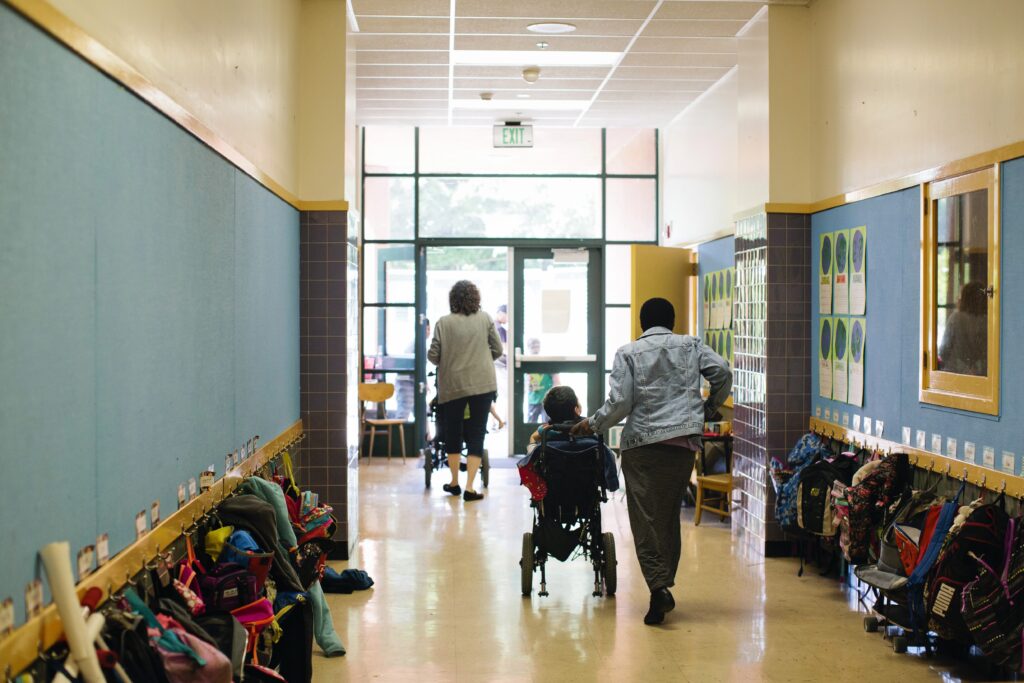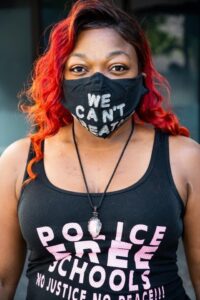 Alison Yin for EdSource
Alison Yin for EdSource Alison Yin for EdSource
Alison Yin for EdSourceOutcomes for disabled students — especially those who are Black or English learners — in one Bay Area school district are so poor that the district is essentially denying the students their right to an education, according to a lawsuit filed Monday.
Pittsburg Unified in the East Bay disproportionately placed Black students and English learners in special education classrooms, did not provide them the services they need, and was more likely to suspend or expel those students, according to the suit, filed by the American Civil Liberties Union of Northern California.
The suit, filed in Contra Costa County Superior Court, names the district, State Superintendent of Public Instruction Tony Thurmond, the State Board of Education, the California Department of Education and the state of California as defendants.
“Black students are literally being denied access to an education, and it’s not right,” said one of the plaintiffs, Jessica Black, who said her daughter, who is Black, fell behind academically while enrolled in special education in Pittsburg Unified. “I know we’re not the only family experiencing this unfairness. I wanted to shed a light on it.”
District Superintendent Janet Schultze called the lawsuit “disappointing,” because she said much of the information is misleading and doesn’t take into account the progress the district has made the past several years in closing achievement gaps among student groups and ensuring a high-quality education for all students.
“We will not let this lawsuit distract from the significant efforts of our district and staff to identify and address disparities,” Schultze said. “As attorneys attend to this situation, I am confident that the facts will set straight the many misleading comments in the ACLU statement, and I am equally confident that the dedicated professionals in our district will not let this deter them from focusing on the needs of our students, who are every day at the heart of their work.”
Pittsburg Unified is an 11,015-student district in eastern Contra Costa County, where 95% of the students are nonwhite and 77% are low-income. Just over 11% are enrolled in special education, which is about equal to the state average.
But students in Pittsburg Unified’s special education classes fare far differently than their disabled peers statewide. They’re almost twice as likely to be suspended and more than five times as likely to be suspended for willful defiance — a discipline category defined as disrupting school activities, according to 2018-19 data from the California Department of Education. California recently banned willful defiance suspensions in elementary and middle schools, encouraging districts to use restorative justice — encouraging students to talk through their conflicts — and counseling as an alternative.
Students with disabilities in Pittsburg Unified were also more likely to be chronically absent, defined as missing more than 10% of school days. Almost 22% were chronically absent in 2018-19, compared to 19.5% statewide.
“Pittsburg Unified has a separate, unequal and illegal system of education for students of color and those with disabilities,” said Linnea Nelson, senior staff attorney for the ACLU of Northern California. “They’re placed in substandard learning environments and subject to unwarranted suspensions and expulsions.”
The lawsuit demands the district improve its process of identifying students with disabilities so that Black and Latino students are not disproportionately placed in special education; provide more tutoring and other academic services to students in special education, so they can catch up to their peers; and change the discipline protocols so Black and Latino students and those with disabilities are not disproportionately suspended or expelled.

Courtesy Jessica Black
Jessica Black is a plaintiff in the ACLU lawsuit against Pittsburg Unified.
Jessica Black’s travails with the district started not long after the family moved to Pittsburg from Minnesota, she said. When her daughter, a third-grader with a learning disability, enrolled in school, she was often teased about her weight and hair, which was in an Afro style. One day, a white boy spat at her, and she threw an apple at him, Black said.
As punishment, the district placed Black’s daughter in a small counseling class apart from her peers, where she fell behind academically, Black said. In sixth grade, Black enrolled her daughter at a regular middle school, but the transition and academic challenges proved too great and Black’s daughter acted out. In sixth grade, she was suspended more than 20 times. One day, when Black’s daughter stormed out of a classroom, a district staff member called the police, and she was strapped to a gurney and transported to a psychiatric hospital, according to the suit.
By eighth grade, she was enrolled in independent study, where she remains. She wants to return — with academic and counseling support — to regular high school, so she can graduate and go to college.
“My daughter was punished for childlike behavior. She would have benefited from trauma-informed practices,” Black said. “The stakes are high because there’s still some time left, and I don’t want my daughter to end up in the school-to-prison pipeline. … This is our lives.”
Other students also suffered under the district’s policies, according to the lawsuit. One boy, a second-grade English learner with autism, was placed in a special education classroom where he watched Disney movies and did arts and crafts instead of learning to read, according to the suit.
Another student, a girl with a learning disability who’s an English learner, is so far behind academically she has to repeat 12th grade in order to graduate.
It’s not the first time Pittsburg Unified has come under scrutiny for its special education practices. In 2016, a consultant hired by the district recommended dozens of improvements for how the district educates students with disabilities. The ACLU suit alleges that the district has not yet adopted many of those recommendations.
To get more reports like this one, click here to sign up for EdSource’s no-cost daily email on latest developments in education.


Comments (6)
Comments Policy
We welcome your comments. All comments are moderated for civility, relevance and other considerations. Click here for EdSource's Comments Policy.
Stephanie 2 years ago2 years ago
My son recently graduated from Pittsburg High School in July 2021. My son is African American and he has had an IEP ever since he was in the 4th grade. My son has ADHD and a Specific Learning Disability. My son transferred to Pittsburg High School the beginning of the 2nd semester of his junior year. Ever since my son started attending Pittsburg High School, my family and I had to fight, tooth and nail, … Read More
My son recently graduated from Pittsburg High School in July 2021. My son is African American and he has had an IEP ever since he was in the 4th grade. My son has ADHD and a Specific Learning Disability. My son transferred to Pittsburg High School the beginning of the 2nd semester of his junior year. Ever since my son started attending Pittsburg High School, my family and I had to fight, tooth and nail, with their resource department just to get the most basic of services that were included in his IEP. We had multiple IEP meetings over the course of my son’s junior and senior year due to concerns that some of his teachers were not accommodating him, and lack of pull-out and push in support. During my son’s senior year, we found out he had not received any IEP services for at least 2 months in a row. When I brought this up at my son’s annual IEP meeting, the school’s IEP team told us they “did not have enough” Instructional Support Specialists or para educators to provide push in or pull out support. During the same IEP meeting, I also confronted my son’s resource specialist regarding the lack of our son’s IEP support. When our son’s resource specialist cited scheduling issues, I reminded him that his scheduling issues were between the district and him and that our son should not have to be denied IEP support because of it.
My ex-husband and I told the IEP team that their failure to adhere to our son’s IEP meant they were out of compliance. We also told them that if they could not provide our son with an Instruction Support Specialist or a para educator for push in or pull out support, their district would have to pay for an outside specialist. When the issue of non-compliance and money came up, Pittsburg High School quickly found a specialist to provide push in and pull out support. Needless to say, we requested our son be placed with a different resource specialist and it was granted. There were other discrepancies with our son’s resource support from Pittsburg High during the time he was a student there. If the ACLU wants to talk to me about our experience, I would be more than happy to.
LOTTYE CLAYTON 2 years ago2 years ago
My heart fell when I read the district superintendent's response to the concerns of the lawsuit. We know how important the attitude of leadership is in addressing and improving such conditions cited in the lawsuit. I was disappointed that the superintendent seemed more concerned about defending her staff and their feelings about the lawsuit than about what might be happening to these student with special needs. My own daughter experienced the problem with the Pittsburg … Read More
My heart fell when I read the district superintendent’s response to the concerns of the lawsuit. We know how important the attitude of leadership is in addressing and improving such conditions cited in the lawsuit. I was disappointed that the superintendent seemed more concerned about defending her staff and their feelings about the lawsuit than about what might be happening to these student with special needs.
My own daughter experienced the problem with the Pittsburg School District’s lack of attention to the special education needs of her son. She was shocked by the attitudes of arrogance and blatant disregard for special education law that she encountered in dealing with some of the staff. Even students know when they are being given a raw deal. Thus, the anger, lack of interest and motivation that manifest in what is perceived as “misbehavior.”
For some students, this is the only way they know how to fight back at adults who show them how little they care about them. Unless the Pittsburg School District is able and willing to own this problem of what is happening to these students, nothing will change. It never cease to amaze me how some educators can, in good conscience, pick up their paychecks at the end of each month – checks that come off the backs of the students they fail to serve – and live with themselves.
Susan W. Morrison 2 years ago2 years ago
As a veteran educator who put 2 boys through school and specialized in teaching ELLs, I'd say this is a tough issue. Because special ed classes can often be disrupted by students acting out, which is why they're there in the first place, it's tough for special ed kids to receive the instruction they need to stay on grade level. One solution to this would be tutors specifically assigned to meet their educational (as opposed … Read More
As a veteran educator who put 2 boys through school and specialized in teaching ELLs, I’d say this is a tough issue. Because special ed classes can often be disrupted by students acting out, which is why they’re there in the first place, it’s tough for special ed kids to receive the instruction they need to stay on grade level. One solution to this would be tutors specifically assigned to meet their educational (as opposed to just behavioral) needs.
And I would be very cautious about putting ELL kids in special ed because that’s two strikes against them. Certainly, they should never be placed in Special Ed for being “slow to learn.” That’s a language problem and an approach that is so horribly outdated.
As far as the high school student who has been discriminated against throughout her school career for being black and acting out, I’d suggest letting her back in high school for her senior year with a personal tutor at her side and the guarantee that no matter what happened, she’d get her diploma.
Ali Warner 2 years ago2 years ago
ACLU needs to also look at San Jose Unified… Horrendous treatment of SPED students.
Brenda Lebsack 2 years ago2 years ago
I find it ironic that California banned willful defiance suspensions in elementary and middle school so kids would not miss educational instruction, while currently mass amounts of children are going on 14 day quarantines and are not guaranteed any educational instruction during this “medical suspension.”
riva mullins 2 years ago2 years ago
Special education services are anemic in general. The Common Core curriculum was not designed with special education in mind.
East Contra Costa schools in general seem to be lacking in special education services. We had to move to a different school district to receive the recommended services. The new school district could not believe what little services has been provided in East Contra Costa.
Navigating IEP services are very complex and not parent friendly.